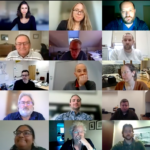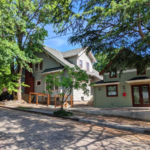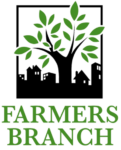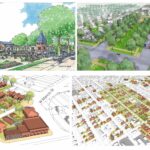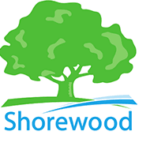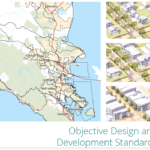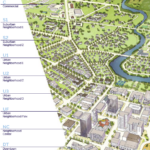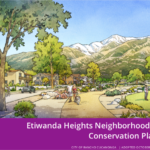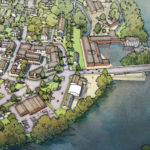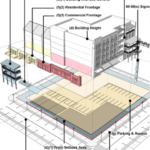(Re)coding communities for smart growth

A stakeholders workshop brought together city and state department staff, business owners, community organizations, real estate agents, planning consultants, and transportation professionals to discuss problems and solutions for off-street parking and loading regulations for Honolulu, Hawaii. (Staff photo)
There’s a secret weapon available to communities that want to modernize their zoning codes and help make smarter growth the norm. FBCI’s Codes for Communities is a wide-ranging technical assistance program at Smart Growth America that covers all kinds of zoning reform and guidance on form-based codes. In just two years, the program has had tremendous impact in communities of all sizes across America.
Zoning codes are the unseen yet decisive guiding force that can either help or hinder the creation of great, walkable, people-scaled places. Reforming these codes doesn’t come easy for any community. Updating antiquated zoning regulations can be daunting and it’s often difficult for elected officials and residents to even imagine a scenario where things can be better. But, thanks to the Form-Based Codes Institute (FBCI)—a program of Smart Growth America—there are resources to help communities move forward, including a comprehensive three-course curriculum, a library of exemplary form-based codes, and zoning experts ready to guide you through the changes that your community needs to make to achieve the walkable, human-scaled, context-sensitive growth they desire.
No matter how simple or complex the issue, FBCI’s Codes for Communities program provides local governments with guidance for success by drawing on the experience and talent of the nation’s most experienced coding professionals. FBCI offers all levels of assistance, from a brief code review to in-depth analyses of existing regulations, interviews with key stakeholders, presentations to community leaders, and a final report with findings and recommendations.
“The FBCI-SGA team made the difference when our Town Council was deciding whether and how to update an ordinance to make it easier to work with and incentivize redevelopment. Their experienced team listened to town staff and other stakeholders, conducted a thorough review of our current ordinance, and made thoughtful and practical recommendations. As a result of their work, our Town Council now recognizes the kinds of changes needed to create great, walkable development. At the conclusion of FBCI’s final presentation, there was Council voted consensus to move forward with changes that will create the kind of urban placemaking they envision.” — Susan Berry Hill, Planning Director, Town of Leesburg, VA
A menu for zoning reform
In many places, the holy grail of zoning reform is adopting a brand new form-based code. It’s a great way to update land-use regulations to create walkable places surrounded by high quality urban form. But not every municipality is ready or able to undertake the full-fledged process of community engagement, education of local leaders and staff, and political buy-in required to rebuild a zoning ordinance from the bottom up. There are scores of other options that are easier to undertake than writing an entirely brand new code, like an expert review or a more targeted tune up. There’s a menu of options ranging in complexity.
FBCI works with communities to improve existing zoning codes—form-based or otherwise—that might be getting in the way of successfully implementing other smart growth policies. Examples include helping Maui County, Hawaii, revise local zoning provisions that were getting in the way of a newly adopted complete streets policy; examining how zoning regulations in Omaha, NE were impacting the city’s transit-oriented development goals; and developing a model off-street parking ordinance in Honolulu, HI to reflect the area’s growing population, changes in land use patterns, improvements in public transit, and clean energy goals.
 Other times, communities approach FBCI with existing form-based codes that aren’t producing the kind of development locals desire. A downtown-adjacent commercial district in Leesburg, Virginia has retained its single-use, auto-oriented, suburban land use pattern for years and has seen virtually no new development, despite adopting a form-based code for the area. So this spring, after several focus group meetings, an in-depth code analysis, and presentations to the Town Council, FBCI advised the Council on why their existing code is not working and provided many specific suggestions for code revisions and a process to get them there.
Other times, communities approach FBCI with existing form-based codes that aren’t producing the kind of development locals desire. A downtown-adjacent commercial district in Leesburg, Virginia has retained its single-use, auto-oriented, suburban land use pattern for years and has seen virtually no new development, despite adopting a form-based code for the area. So this spring, after several focus group meetings, an in-depth code analysis, and presentations to the Town Council, FBCI advised the Council on why their existing code is not working and provided many specific suggestions for code revisions and a process to get them there.
Unsure what the problem is or where to start? FBCI will review your local zoning codeto determine if it will support walkable, mixed-use development, and if not, why not. In Fauquier County, Virginia, for instance, FBCI took a look at a draft form-based code that staff had prepared for the small town of Marshall. Staff reported that, because form-based codes are new to the county, the FBCI review gave both staff and decision makers the confidence to know they were on the right track. The Marshall Code has since been adopted, encouraging contextual, walkable growth that meshes with the old-town feel that residents cherish.
In Charlottesville, Virginia, FBCI is working with expert code-writing firm DPZ Partners LLC to write a new form-based codefor a mixed-income neighborhood. The project will result in a cutting-edge form-based code to help realize a new a citywide affordable housing strategy. The project has included months of collaboration with local staff, extensive community engagement—including a neighborhood charrette—a housing needs assessment, and an economic analysis of alternative strategies for encouraging affordable housing development.
Don’t shy away from the “Z” word. Zoning reform can be made easier with the help of the Form-Based Codes Institute. Learn more about the program and whether FBCI Codes for Communities is right for your community on the Codes for Communities webpage.


